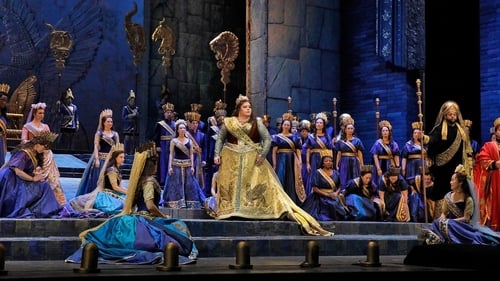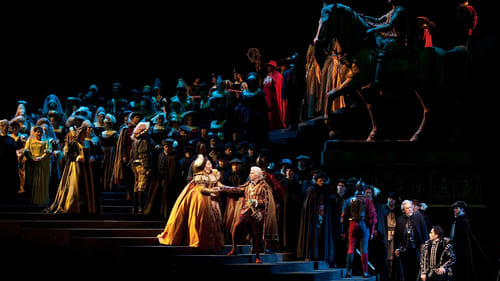
Ernani is a love story about a young woman, Elvira, caught between three men: her lover, the nobleman-turned-outlaw Ernani; her guardian, the rich, elderly de Silva, who wants her for himself; and Don Carlo, the King of Spain who also has his eye on Elvira. Given the number of protagonists, it is also the story of a tragedy. Only 14 years after the premiere of Hernani, Giuseppe Verdi adapted Victor Hugo’s play into an opera to premiere at La Fenice, Venice in 1844. Ernani was an immediate and lasting triumph for the young Verdi, marking his prowess at adapting an historical event (the crowning of Charles V as emperor at Aachen Cathedral) to a psychologically convincing musical drama. The backdrop of three men paying court to one woman was the perfect foil for Verdi to explore the expressive qualities of three types of male voice. The tenor, the bass and the baritone.

Aida
La histórica producción con escenografía de Mestres Cabanes regresa al Liceu con Pirozzi, Margaine y Meade. La Aida de nuestros padres, de nuestros abuelos o de nuestros bisabuelos. Vuelven los decorados hiperrealistas de Josep Mestres Cabanes, realizados en 1945 y que muestran con todo su esplendor la gran escuela de la escenografía catalana. Siempre al servicio de la pomposidad —pero también del intimismo— de la antepenúltima ópera de Verdi, los decorados del artista de Manresa siguen la tradición del historicismo sin caer nunca en lo kitsch.

In the aftermath of the Trojan war, a series of unrequited loves threatens to destabilise the fragile peace. But for a spurned Spartan princess, there are only two options left: forgiveness and murder. The most ambitious and innovative of all Rossini’s operas, Ermione was a calamitous failure on its opening night at the Teatro di San Carlo 200 years ago. It now returns to the Neapolitan theatre in a new production by Italian director Jacopo Spirei starring American soprano Angela Meade in the title role.

Semiramide
A rarely performed bel canto gem, Rossini’s Semiramide returned to the Met for the first time in nearly 25 years during the 2017–18 season. Set in ancient Babylon under the reign of the mythic Queen Semiramis, the opera features political scheming, mistaken identity, divine intervention, and bloodthirsty revenge—not to mention one virtuosic vocal display after another. Soprano Angela Meade is the fierce title monarch, whose quest for power comes to a halt with the discovery that the object of her affection, the warrior Arsace—sung by mezzo-soprano Elizabeth DeShong—may actually be her long-lost son. Together, the two square off in a pair of dazzling duets and deliver some of the opera’s most challenging arias. Bel canto specialist Maurizio Benini takes the podium to lead a cast that also stars tenor Javier Camarena as the ardent prince Idreno, bass Ildar Abdrazakov as the scheming Assur, and bass Ryan Speedo Green as the stern high priest Oroe.

Alice Ford
Music Director James Levine conducts his first new Met production after a two-year absence: Robert Carsen’s hit staging of Verdi’s great human comedy. Ambrogio Maestri is an ideal Falstaff, leading an extraordinary ensemble cast of veteran and up-and-coming Met stars, including Angela Meade (Alice), Stephanie Blythe (Mistress Quickly), Franco Vasallo (Ford), and Jennifer Johnson Cano (Meg). Lisette Oropesa and Paolo Fanale are the young lovers, Nannetta and Fenton.

Elvira
Rising Met star Angela Meade is Elvira, the young woman caught between three men: her lover, the nobleman-turned-outlaw Ernani (Marcello Giordani); her guardian, the rich, elderly de Silva, who wants her for himself (Ferruccio Furlanetto); and Don Carlo, the King of Spain, who also desires Elvira (Dmitri Hvorostovsky). Verdi’s early drama is full of sweeping melody and rousing rhythms, delivered masterfully by the Met Orchestra and Chorus conducted by Marco Armiliato.

Self
An engrossing behind-the-scenes quasi-documentary as 10 hopefuls vie for a spot on the Met's roster.





